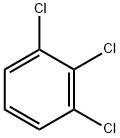1,2,4-Trichlorobenzene , StandardforGC,≥99.5%(GC) , 120-82-1
Synonym(s):
1,2,4-TCB;1,2,4-Trichlorobenzene;acs solvents;high purity solvents
CAS NO.:120-82-1
Empirical Formula: C6H3Cl3
Molecular Weight: 181.45
MDL number: MFCD00000547
EINECS: 204-428-0
PRODUCT Properties
| Melting point: | 16 °C(lit.) |
| Boiling point: | 214 °C(lit.) |
| Density | 1.454 g/mL at 25 °C(lit.) |
| vapor density | >6 (vs air) |
| vapor pressure | 1 mm Hg ( 40 °C) |
| refractive index | n |
| Flash point: | >230 °F |
| storage temp. | 2-8°C |
| solubility | water: insoluble |
| form | Liquid |
| color | Clear |
| Odor | Characteristic aromatic odor |
| explosive limit | 6.6%, 150°F |
| Water Solubility | INSOLUBLE |
| λmax | λ: 308 nm Amax: 1.00 λ: 310 nm Amax: 0.50 λ: 350 nm Amax: 0.05 λ: 375-400 nm Amax: 0.01 |
| Merck | 14,9631 |
| BRN | 956819 |
| Henry's Law Constant | 0.997 at 20.0 °C (wetted-wall column, ten Hulscher et al., 1992) 1.24, 2.27, 2.58, 3.06, and 3.90 at 2.0, 6.0, 10.0, 18.0, and 25.0 °C, respectively (EPICS-SPME,
Dewulf et al., 1999) |
| Exposure limits | NIOSH REL: TWA ceiling 5 ppm (40 mg/m3); ACGIH TLV: ceiling 5 ppm
(adopted). |
| Dielectric constant | 2.2400000000000002 |
| Stability: | Stable. Incompatible with strong oxidizing agents. Combustible. |
| LogP | 4.28 |
| CAS DataBase Reference | 120-82-1(CAS DataBase Reference) |
| NIST Chemistry Reference | Benzene, 1,2,4-trichloro-(120-82-1) |
| EPA Substance Registry System | 1,2,4-Trichlorobenzene (120-82-1) |
Description and Uses
Trichlorobenzenes (TCBs) are synthetic chemicals that occur in three different isomeric forms. The three chlorinated cyclic aromatic isomers are 1,2,3-trichlorobenzene (1,2,3-TCB), 1,2,4-trichlorobenzene (1,2,4-TCB), and 1,3,5-trichlorobenzene (1,3,5-TCB). 1,2,4-TCB is one of the 188 chemicals designated as a hazardous air pollutant under the Clean Air Act.
1,2,4-Trichlorobenzene is used as a dielectric and heat transfer fluid in transformers. It acts as an intermediate, degreaser, wood preservative and solvent for dye. It is a high-temperature solvent used in gel permeation chromatography, especially for polyethylene and polypropylene. Further, it is used as a lubricant and as a synthetic transformer oil.
Safety
| Symbol(GHS) |   GHS07,GHS09 |
| Signal word | Warning |
| Hazard statements | H302-H315-H410 |
| Precautionary statements | P264-P270-P273-P280-P301+P312-P302+P352 |
| Hazard Codes | Xn,N,Xi,T,F |
| Risk Statements | 22-38-50/53-52/53-39/23/24/25-23/24/25-11-51/53 |
| Safety Statements | 23-37/39-60-61-45-36/37-16-7 |
| OEL | Ceiling: 5 ppm (40 mg/m3) |
| RIDADR | UN 2321 6.1/PG 3 |
| WGK Germany | 3 |
| RTECS | DC2100000 |
| Autoignition Temperature | 571 °C |
| Hazard Note | Irritant |
| TSCA | Yes |
| HazardClass | 6.1 |
| PackingGroup | III |
| HS Code | 29036990 |
| Hazardous Substances Data | 120-82-1(Hazardous Substances Data) |
| Toxicity | LD50 orally in Rabbit: 550 mg/kg LD50 dermal Rat 6139 mg/kg |
| 発がん性評価について | EPA D |



